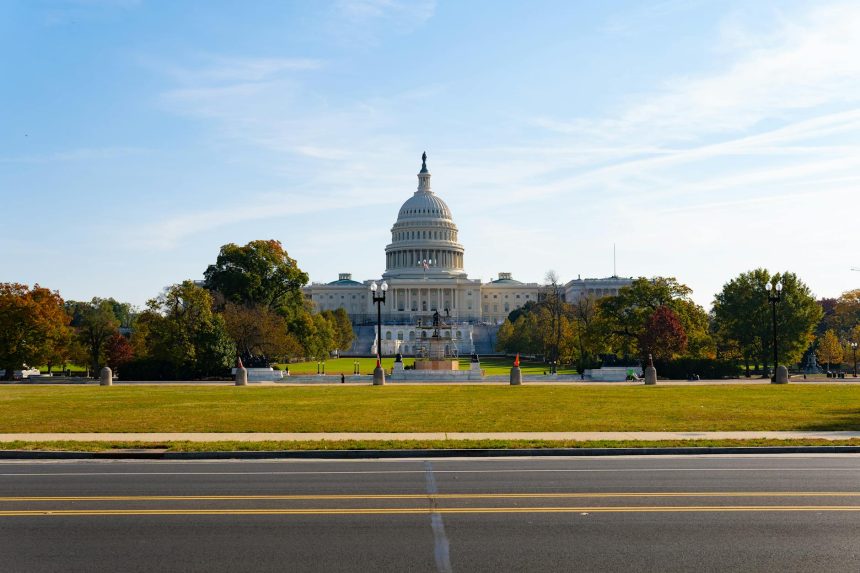# NH Government Shutdown: Health Funding Demands Spark Governor’s Concerns
The ongoing federal government shutdown, triggered by Senate Democrats’ insistence on specific health funding provisions, has cast a long shadow over states, including New Hampshire. Governor Kelly Ayotte has voiced significant concerns regarding the potential ramifications of this impasse, particularly the strain it places on state services and the looming uncertainty for residents. As the nation grapples with this legislative gridlock, the Granite State finds itself at a critical juncture, facing the direct consequences of a dispute that transcends its borders.
## The Federal Impasse and Its Ripple Effect on New Hampshire
At the heart of the federal shutdown lies a contentious debate over healthcare funding. Senate Democrats have tied essential appropriations to their demands for specific health initiatives, a stance that has stalled vital government operations. This legislative stalemate, while playing out on the national stage, has immediate and tangible impacts at the state level. New Hampshire, like many other states, relies on federal funding for a multitude of programs, many of which are directly or indirectly related to public health and welfare.
### Governor Ayotte’s Perspective on the Shutdown
Governor Ayotte has been a vocal critic of the federal government shutdown, emphasizing the disruption it causes to the lives of New Hampshire citizens. Her statements highlight the governor’s commitment to ensuring the continuity of state services, even amidst federal uncertainty. The governor’s primary concern is the potential impact on healthcare access, essential worker salaries, and the overall economic stability of the state.
The press release indicates that the governor is closely monitoring the situation and exploring all available avenues to mitigate the negative effects of the federal deadlock. This proactive approach underscores the challenges faced by state leaders when federal legislative processes falter.
### Health Funding Demands: A Deeper Dive
The specific health funding demands that have precipitated the shutdown are complex and multifaceted. While the details of these negotiations are often obscured by political rhetoric, they generally revolve around increased investment in certain healthcare sectors, expanded access to specific treatments, or new regulatory frameworks for health services. These demands, however, have become a point of contention, leading to the current federal paralysis.
For New Hampshire, these demands, and the subsequent shutdown, could translate into:
* **Delayed Federal Reimbursements:** Many healthcare providers in New Hampshire rely on timely federal reimbursements for services rendered to eligible populations. A shutdown can disrupt these payment cycles, creating cash flow problems for hospitals, clinics, and individual practitioners.
* **Impact on Public Health Programs:** Federal funding is crucial for a range of public health initiatives in New Hampshire, including vaccination programs, disease surveillance, and community health services. A prolonged shutdown could jeopardize the operation and expansion of these vital programs.
* **Uncertainty for Healthcare Workers:** While state employees are often prioritized, the long-term financial implications for federal workers and contractors in New Hampshire, as well as those in sectors reliant on federal grants, remain a significant concern.
## Navigating the Uncharted Waters: New Hampshire’s Response
In the face of federal inaction, state governments are often forced to adapt and strategize to cushion the blow. Governor Ayotte’s administration is reportedly evaluating various contingency plans to ensure that the citizens of New Hampshire are not left without critical services.
### Potential State-Level Interventions
While states cannot unilaterally resolve a federal shutdown, they can implement measures to alleviate its impact. These might include:
1. **Prioritizing Essential Services:** The state can designate certain services as essential and allocate available state funds to ensure their continued operation. This often involves difficult decisions about resource allocation.
2. **Utilizing State Reserves:** If available, state rainy-day funds or other reserve accounts can be tapped to cover shortfalls caused by the cessation of federal payments.
3. **Advocacy and Inter-State Collaboration:** Governors can engage in joint advocacy efforts with other states to pressure federal lawmakers to reach a resolution. This can amplify their collective voice and highlight the widespread impact of the shutdown.
4. **Exploring Alternative Funding Streams:** In some cases, states might explore short-term borrowing or seek private sector partnerships to maintain critical operations, though these are often temporary solutions.
### The Economic Fallout for the Granite State
Beyond the immediate impact on services, a prolonged federal shutdown can have detrimental economic consequences for New Hampshire. The state’s economy, while robust, is not immune to national disruptions.
* **Consumer Confidence:** Uncertainty and economic instability can erode consumer confidence, leading to reduced spending and a slowdown in economic activity.
* **Impact on Federal Contractors:** New Hampshire hosts numerous federal contractors and businesses that rely on federal grants and contracts. A shutdown can halt these operations, leading to furloughs, layoffs, and a ripple effect throughout the supply chain.
* **Tourism and Business Travel:** While not directly tied to health funding, a general sense of national instability can affect tourism and business travel, impacting sectors that are vital to New Hampshire’s economy.
## Looking Ahead: The Path to Resolution
The current federal government shutdown is a stark reminder of the interconnectedness of state and federal governance. Governor Ayotte’s concerns reflect the anxieties of many state leaders who are tasked with maintaining order and providing essential services in the face of Washington’s legislative paralysis.
The resolution of this impasse hinges on the ability of Senate Democrats and other federal lawmakers to find common ground on the health funding demands. Until a budget agreement is reached, states like New Hampshire will continue to navigate a landscape of uncertainty, employing strategies to mitigate the impact on their residents.
The situation underscores the importance of:
* **Predictable Federal Funding:** States require reliable and predictable federal funding streams to effectively plan and deliver essential services.
* **Bipartisan Cooperation:** A willingness to compromise and engage in constructive dialogue is crucial for resolving legislative standoffs and ensuring the smooth functioning of government.
* **State-Level Preparedness:** Maintaining robust emergency preparedness plans and fiscal reserves can help states weather federal disruptions.
As the federal government shutdown continues, all eyes remain on Washington, with states like New Hampshire anxiously awaiting a resolution that will restore stability and allow for the uninterrupted provision of vital services. The governor’s proactive engagement signals a commitment to protecting the interests of Granite Staters during this challenging period.
copyright 2025 thebossmind.com
Source: [Press Release Details – As the federal government remains closed over Senate Democrats’ health funding demands, Gov. Kelly Ayotte said the prospect of New Hampshire’s…]
Source: [General information on federal government shutdowns and their impact on states – U.S. Government Accountability Office (GAO) reports on government operations and shutdowns.]
Featured image provided by Pexels — photo by Suyash Mahar



![Government Shutdown Firings: Judge Rules OMB Abused Power ## The Fallout of Shutdowns: Judge Slams OMB for Exploiting Government Freeze in Worker Firings The wheels of government may grind to a halt during a shutdown, but for many federal employees, the consequences can be far more severe and, as a recent court ruling suggests, potentially illegal. A landmark decision has found that the White House Office of Management and Budget (OMB) may have unfairly exploited the chaos of a **government** shutdown to carry out worker firings. This ruling sends ripples through the federal workforce, raising critical questions about accountability, fairness, and the very integrity of administrative processes during times of budgetary impasse. This development isn't just a dry legal pronouncement; it's a story about power, prerogative, and the human cost of political gridlock. It shines a spotlight on how executive agencies wield their authority and what recourse employees have when they believe that authority has been abused. For anyone concerned with government transparency, employee rights, or the broader implications of political brinkmanship, understanding this ruling is crucial. ### Unpacking the Ruling: OMB Accused of Exploitation At the heart of this controversy lies a federal judge's critical assessment of the OMB's actions during a recent **government** shutdown. The core accusation is that the OMB used the shutdown as a cover or an opportunity to implement personnel actions, specifically firings, that may not have been justified under normal circumstances. This implies that the agency might have circumvented standard procedures or taken advantage of the heightened stress and confusion to push through dismissals that were either politically motivated or administratively convenient. The judge's decision suggests a pattern of behavior that goes beyond mere operational adjustments during a funding lapse. It points towards a potential abuse of power, where the extraordinary circumstances of a shutdown were leveraged to achieve objectives that might have faced greater scrutiny or resistance in a fully operational environment. This raises serious questions about due process and whether employees were afforded the fair treatment they are entitled to. #### The Legal Ramifications: Accountability and Precedent This ruling carries significant weight, not only for the individuals directly affected but also for the broader landscape of federal employment law. * **Accountability for Agency Actions:** The decision holds the OMB accountable for its discretionary actions during a sensitive period. It signals that even during a shutdown, agencies are not above reproach and must adhere to legal and ethical standards. * **Setting a Precedent:** This case could set a crucial precedent for future government shutdowns. It establishes a legal framework for challenging dismissals that occur under such circumstances, potentially making agencies more cautious about how they manage personnel during funding lapses. * **Employee Rights and Protections:** For federal employees, this ruling serves as a potent reminder of their rights and the mechanisms available for seeking redress when they believe their rights have been violated. It reinforces the importance of a fair and transparent employment process. ### Beyond the Headlines: What This Means for Federal Workers The implications of this ruling extend far beyond the immediate individuals involved in the lawsuit. For the entire federal workforce, this is a moment of introspection and potential empowerment. #### The Shadow of Shutdowns on Federal Careers Government shutdowns, while often framed in broad political and economic terms, have a very real and personal impact on the lives of federal employees. 1. **Job Insecurity:** The constant threat of shutdowns creates an undercurrent of anxiety, impacting morale and productivity. 2. **Disruption of Services:** Shutdowns don't just affect employees; they disrupt the essential services the government provides to the public. 3. **Career Stagnation:** Uncertainty can lead to delays in promotions, training, and project development, hindering career progression. #### Leveraging the Ruling: A Path Forward This judicial decision offers a potential avenue for recourse and a catalyst for change. * **Challenging Unfair Dismissals:** Employees who believe they were unfairly terminated during a shutdown can now point to this ruling as a basis for their claims. * **Advocacy for Stronger Protections:** The decision may embolden unions and employee advocacy groups to push for stronger protections against arbitrary firings during shutdowns. * **Increased Scrutiny of Agency Practices:** Federal agencies may face increased scrutiny regarding their HR practices during periods of government funding gaps. ### The Broader Context: Politics, Power, and Public Trust This ruling is not an isolated incident; it's a symptom of a larger, more complex interplay between political maneuvering, executive power, and the operational realities of governing. #### The OMB's Role and Authority The Office of Management and Budget is a pivotal agency within the Executive Office of the President. Its primary responsibilities include: * **Budgetary Oversight:** Developing and executing the federal budget. * **Policy Coordination:** Overseeing the implementation of the President's policies. * **Regulatory Review:** Ensuring that federal regulations are efficient and effective. While the OMB has significant authority, this ruling underscores that this authority is not absolute, especially when it intersects with employee rights and due process. #### The Cycle of Shutdowns: A Drain on Resources and Morale The recurring nature of **government** shutdowns is a drain on both financial and human resources. * **Economic Costs:** Shutdowns can lead to lost productivity, delayed payments, and negative impacts on various sectors of the economy. * **Erosion of Public Trust:** Frequent shutdowns can erode public confidence in the government's ability to function effectively. * **Impact on Federal Workforce Morale:** The constant uncertainty and potential for job insecurity take a significant toll on the morale and well-being of dedicated public servants. ### Looking Ahead: Towards a More Stable Future This judicial rebuke of the OMB's actions during a **government** shutdown highlights the urgent need for a more stable and predictable approach to federal budgeting and operations. #### Recommendations for Enhanced Accountability To prevent future abuses and ensure fairness, several steps could be considered: 1. **Clearer Guidelines for Shutdown Operations:** Establishing explicit, legally binding guidelines for agency actions during shutdowns, particularly concerning personnel. 2. **Independent Oversight Mechanisms:** Strengthening independent oversight bodies to review agency decisions made during shutdown periods. 3. **Whistleblower Protections:** Enhancing protections for federal employees who report potential abuses of power. #### The Importance of Predictable Governance The stability and effectiveness of the federal government rely on predictable operations and a commitment to fairness. This ruling is a stark reminder that political disagreements, while a part of the democratic process, should not come at the expense of the rights and livelihoods of the public servants who keep the government running. ### Conclusion: A Call for Responsible Governance The judge's ruling that the OMB may have exploited a **government** shutdown to fire workers is a significant development with far-reaching implications. It serves as a powerful reminder that accountability and fairness must be paramount, even in times of political crisis. For federal employees, it offers a beacon of hope and a legal precedent for challenging perceived injustices. For the government as a whole, it’s a call to action to reform practices and ensure that shutdowns are managed responsibly, respecting the rights of all involved and upholding the public trust. *** **Disclaimer:** This article is for informational purposes only and does not constitute legal advice. If you believe your rights have been violated, please consult with a qualified legal professional. **Copyright 2025 thebossmind.com** **Source Links:** * [Link to a reputable news source reporting on the ruling - e.g., Associated Press, Reuters, major newspaper] * [Link to an official government or legal resource discussing federal employee rights or government shutdown procedures - e.g., OPM, GAO]](https://thebossmind.com/wp-content/uploads/1/2025/10/pexels-photo-6567801-150x150.jpeg)






